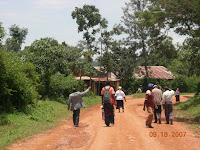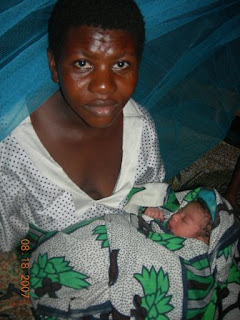Emmanuel, Justis and I are back safely from Moshi Tanzania, at the foot of Mount Kilimanjaro. One of the reasons we went was to continue the search for Ema’s father.
Thankfully, we got a little closer, but we have a ways to go. Ema visited the farm where his father used to work in Rongai clear on the other side of Kilimanjaro.
The owner said that he remembered “Mzee Juma” very well, but that he left a long time ago- about the time that Ema’s mother and father split. He told Ema that Juma was a good tractor driver and that he most certainly stayed with farm work when he returned to Kenya. The man advised Ema to check the tea plantations in Kenya.
The most helpful news though, was that we got confirmation from someone who saw him living in Bungoma, Kenya just four years ago. Frustratingly, Bungoma is just a little ways away from Busia, where Caito and Ema went last month.
On December 27, 2007 Kenya holds its national elections. We want to get notices up at every voting site that we can. We have several targets:
Foreign volunteers in Bungoma (Habitat for Humanity, other orgs)
Foreign travelers going to Mt. Elgon (notices should be posted on travel boards such as lonelyplanet.com and thorntree)
Government officials whom Caito and Emmanuel met on their Kenya trip
The Kenyan Embassy in Dar es Salaam
Any and All people residing or working in Bungoma who have emails online (more people than you would think)
We are tapped out on funds and we are reaching out to you, our supporters, to help us do our research the good old fashioned way, on the internet! If anyone wants to help, please just do web searches (using google and non-google engines) for Bungoma and collect all the emails or phone numbers that you can for NGOs, local government officials-anyone with a pulse in Bungoma. We will then send a letter or call them. If they agree to help we can send a notice to print and be posted at the voting polls. If anyone wants to post on the travel web boards, that would be a huge help.
Emmanuel remains hopeful. When I spoke to his grandmother, the woman who raised him, she told me that Emmanuel has always been determined to find his father. As a small boy he set out alone for Nairobi to find him and was brought home by police.
BONUS QUESTION!! In my research, I found that Emmanuel’s father belongs to the same tribe as none other than Barak Obama. That makes Ema and Barak both "Luo". Anyone who happens to be chatting with Mr. O can tell him that he can buy my vote for the cost of an all expense paid trip to Bungoma in service to a fellow tribesman.































.JPG)











